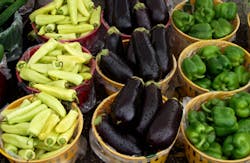MELBOURNE, Australia — The last five years have not been easy for Australian fruit and vegetable processing businesses and the changes in the market environment have had a significant impact on the nearly 600 companies operating in the sector. They have had to adapt to the new conditions and have faced a number of challenges, such as increased competition coming from foreign businesses and private-label products entering the market, which have largely limited the industry”s opportunities for growth. These are some of the conclusions published in a new report from industry research firm IBISWorld that sheds light on the current state of the Australian fruit and vegetable processing industry and its development over the past five years.
RELATED: Niche food market sees rapid growth in Australia
IBISWorld industry analyst Naren Sivasailam commented that the industry, which employs more than 10,000 people, has seen a rise in imports, mostly due to the upward movement of the Australian dollar and declining domestic production. This, is turn, has been fueled by poor weather conditions and the increasingly adopted practice of supermarkets directly sourcing processed food products from abroad. Combined with the fierce competition from private-label products, which are gradually gaining market share, this has led to an overall decline in industry performance, Sivasailam explained.
Over the five-year period leading up to 2012/13, total revenues increased by an annual average of 0.4 percent to AU$5.35 billion. The report predicts revenue growth of 0.5 percent in 2012/13.
According to IBISWorld, the future of the Australian fruit and vegetable processing industry will be shaped by a number of factors, such as population growth, competition from foreign businesses, adoption rates of private labels, weather conditions and horticulture product prices. Sivasailam believes that imports will continue to rise and will claim a larger market share. Private labels are increasingly popular among consumers who frequently see them as cheaper alternatives, forcing brands to sell their products on discounts to maintain demand. These factors are predicted to contribute to declining revenues and lower prices of fruit and vegetables.
The way out of the situation for the local fruit and vegetable processing industry is to introduce new value-added products, which can boost consumer demand and relieve the pressure on manufacturers to push prices downwards, the report stated. Another optimistic development is the fact that consumers are becoming more health-conscious and are investing in healthy nutrition — a trend that leads to increasing fruit and vegetable consumption, Sivasailam commented. It is also likely that demand for convenience-based foods like frozen vegetables and soups will grow, as consumers have busier lives.
The Australian fruit and vegetable processing industry consists of some 598 businesses, over half of which have total revenues of more than AU$200,000. There are four major players on the market: Simplot Australia, Coca-Cola Amatil, Heinz Wattie”s and McCain Foods. The companies included in the report operate in bottling, canning, preserving, quick-freezing and quick-drying of fruit and vegetables.
